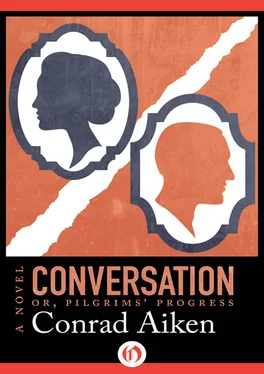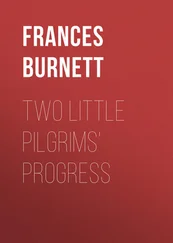Conrad Aiken
Conversation; or, Pilgrims' Progress
“… and after many difficulties in boisterous storms, at length, by God’s providence, upon the 9th November following, by break of the day we espied land, which we deemed to be Cape Cod; and so afterward it proved. And the appearance of it much comforted us, especially seeing so goodly a land, and wooded to the brink of the sea; it caused us to rejoice together, and praise God that had given us once again to see land. And thus we made our course S.S.W., purposing to go to a river ten leagues to the south of the Cape; but at night, the wind being contrary, we put round again for the bay of Cape Cod; and upon the 11th November we came to an anchor in the bay, which is a good harbour and pleasant bay, circled round, except in the entrance, which is about four miles over from land to land, compassed about to the very sea with oaks, pines, juniper, sassafras, and other sweet wood.… There was the greatest store of fowl that ever we saw.…”
— JOURNAL OF THE PILGRIMS
“Tirra-lirra, tirra-loo, tirra-lirra, tirra-lee—”
“That doesn’t make sense, daddy.”
“Neither it does. But what does it matter? What’s the difference between a loo and a lee? And now then, young woman, how about getting out of that there bath. It’s late! Look how late it is! It’s autumn! The leaves are falling off the trees! It’s going to be cold, you’ll catch your death of cold!”
“Oh, but it’s so nice in here. Can I do just one handsquirt, just one?”
“Just one. And the leaves came tumbling down—”
“Why do the leaves come off the trees, daddy?”
“Now out you get. Up—!”
He loved to feel the firm small wet body, the compact little chest, between his hands, the legs wriggling and thrusting for the bathmat as he put her down: it was as good as eating, as good as drinking. As good as singing, as good as autumn. The round face, the blue eyes, emerged from the rapid towel to say:
“But why do the leaves tumble off the trees!”
“Listen to them scuttling like mice in the pathway, listen to them blowing!”
“But why, but why!”
“I’ll tell you what it is, Buzzer, it’s a mystery.”
“A mystery!”
They gazed together, turning, out of the little groundfloor window of the bathroom, watched the poplar leaves floating down, streaming on air, wafts and drifts and chains of them, golden and endless — like a kind of music, he thought, as inexhaustible and without origin as music.
“But of course you wouldn’t know what a mystery is, would you?”
“A mystery, a mystery, a mystery—”
“It’s a nice word, and a very important one. It’s one of those words as big as a barn door, as big as a circus tent, as big as a railway station, as big as a hollowed-out mountain, so that you can drive anything you like into it — herds of sheep, flocks of cattle, horses, trucks, armies, wagons, cannons, ideas, stars, worlds, moons — in fact, anything you like. See?”
“Now my hands!”
“Did I forget those hands—? Foo! But you see, my pet, it’s like this. Once a year the trees all get very tired, and very sleepy, and they want to go to bed.”
“To bed! Ho ho, how silly, as if a tree could go to bed! Ho ho!”
“Yes, sir, to bed. They want to go to sleep, and so what do they do? They do just exactly what you do, they take off their clothes.”
“And the leaves are their clothes! But we don’t have leaves for clothes, daddy!”
“Ah, that’s just where you’re wrong. Didn’t you ever hear tell of Mother Eve?”
“Of course! Eve and Adam were the first man and woman in the Garden of Eden. Anybody knows that . Now my toes !”
She lifted one foot, waggled the toes at him.
“Quite right. And you see, Eve wore a fig leaf, that’s what she did—”
“And took it off in the autumn, when she wanted to go to sleep?”
“Well, I daresay. Anyway, that’s what they say she wore — you’d think it must have been a little bit chilly, wouldn’t you! Tirra-lirra, tirra-loo—”
“And then do the trees go to sleep?”
She put her hands on the window sill, to look again at the falling of the leaves, automatically raised them as he lowered the little nightgown over the curled head, and worked them skilfully through the sleeves, the face with primmed mouth once more emerging in triumph, like a seal from a wave.
“The trees, bless their hearts, go to sleep. All winter they just dream and rest, exactly, for all the world, as if they were in their beds. After all, you have flower beds, you know!”
“Ho ho — and who’d like to sleep in a flower bed! Not me!”
He turned her around, opened the door, smacked her small bottom, guided her toward the hall with a firm finger planted in the middle of her back.
“Well, off to your own, then, if you like that better. Quick! March!”
Ahead of him, she scrambled barefoot up the painted stairs, straddling a little to do so, and he followed smiling. Wind-borne and uneven, he heard the church clock striking seven, and listened, as always, for the queer quavering stammer of the final stroke. The Unitarian Church, the village, the main street, the post office, the evening mail — already the loquacious line would be forming in the shabby little post office, the townsfolk would be there for the evening inspection of each other, the evening spying into each other’s affairs. And there might be a letter — his heart began to beat more quickly — he mustn’t think of that. And yet, why not? It ought to seem particularly naughty — just now, just here — with Buzzer reaching up to trip the latch of the dusk-filled bedroom — but it didn’t. No morals in nature, none!
“Tirra-lee!” he said, “and into bed with you.”
“Why did you give me my bath? Why didn’t mummy give me my bath?”
“Because mummy was very tired, see?”
“Well, then, you must tell me a story.”
“I’ll tell you a story about John McGlory—”
“Not that one!”
“I’ll tell you another about his brother—”
“No, no, no, no, no !”
“There isn’t time tonight, my pet. The world’s coming to an end any minute now, and daddy must be there to see it. In with you!”
He threatened her comically, with raised hand, and, pretending alarm, she skipped into the little cot, whipping the pink feet under the blue counterpane, with its embroidered birds.
“Ho ho,” she said, “you can’t fool me ! It isn’t coming to an end! Good night.”
“Good night.”
He stooped to kiss the still damp cheek; the blue eyes looked abstractedly past him, she was already dismissing him, she had already begun to sing her night-song. Good lord — he thought — how quickly they do it, how quickly they swoop from one world into another! If it was only as easy as that! Patting her knee idly, and straightening up, he looked through the screened window into the little garden, saw Chattahoochee, the cat, in the act of sitting down demurely under the poor bare-armed little plum tree — if ever a tree had committed suicide, that one had — and beyond it, beyond the low white fence, Mrs. Purington moving about in her kitchen next door. A motor boat was chugging in the river, probably Mr. Riley, the fisherman, back from scalloping, the dirty blue boat, foul with fish scales, approaching the Town Landing — maybe it would be a good idea to go and see. On his way to the post office? Afterward? In case there should be a letter—? He frowned as he turned away and closed the white door behind him, frowned as he hesitated at the top of the stairs. But there was Enid, there was Endor, there was Ee — he could hear her in the kitchen now, the clink of a saucepan on the stove, or the sink — and resentment was unmistakable in the sound, it had been piling up all day. Odd, how one knows — just as one knows a storm is approaching, feels it in the air — the distant mutter even while the sky is still hot and cloudless, the first little sinister breeze turning the silver seams of the poplar trees, a chill draft from the southwest, and then the mounting purple of the clouds, and the Unitarian church steeple turning — suddenly — a livid tombstone white. He took out the watch from the pocket of his khaki trousers — how ridiculous, he knew perfectly well what time it was — and replaced it without looking at it. And now, on top of everything else, this unfortunate business of Jim Connor—
Читать дальше












